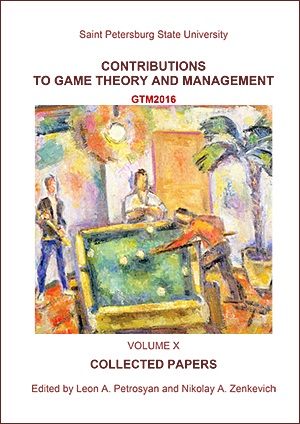Types of Equilibrium Points in Antagonistic Games with Ordered Outcomes
Abstract
Saddle point concept is a basic one for antagonistic games with payoff functions. For more large class consisting of games with ordered outcomes, there are different generalizations of the saddle point concept. In this article we consider three types of equilibrium for games with ordered outcomes, namely, saddle points (or Nash equilibrium points), general equilibrium points and transitive equilibrium points. The main definitions concerning games with ordered outcomes are introduced in section 1. In section 2, necessary and sufficient conditions for saddle points in games with ordered outcomes are found. These conditions are formulated by using the so-called characteristic sets of players. Transitive equilibrium points are considered in section 3. Theorem 3 characterizes transitive equilibrium points in antagonistic games with ordered outcomes as pre-images of saddle points in antagonistic games with payoff functions under strict homomorphisms. The main result of this article is theorem 4 in which analogy result for mixed extension of game with ordered outcomes is proved. In constructing of mixed extension of game with ordered outcomes, we use the so-called canonical extension of an order on the set of probabilistic measures.
Keywords:
game with ordered outcomes, saddle point, general equilibrium point, transitive equilibrium point
Downloads
References
Downloads
Published
How to Cite
Issue
Section
License
Articles of "Contributions to Game Theory and Management" are open access distributed under the terms of the License Agreement with Saint Petersburg State University, which permits to the authors unrestricted distribution and self-archiving free of charge.




